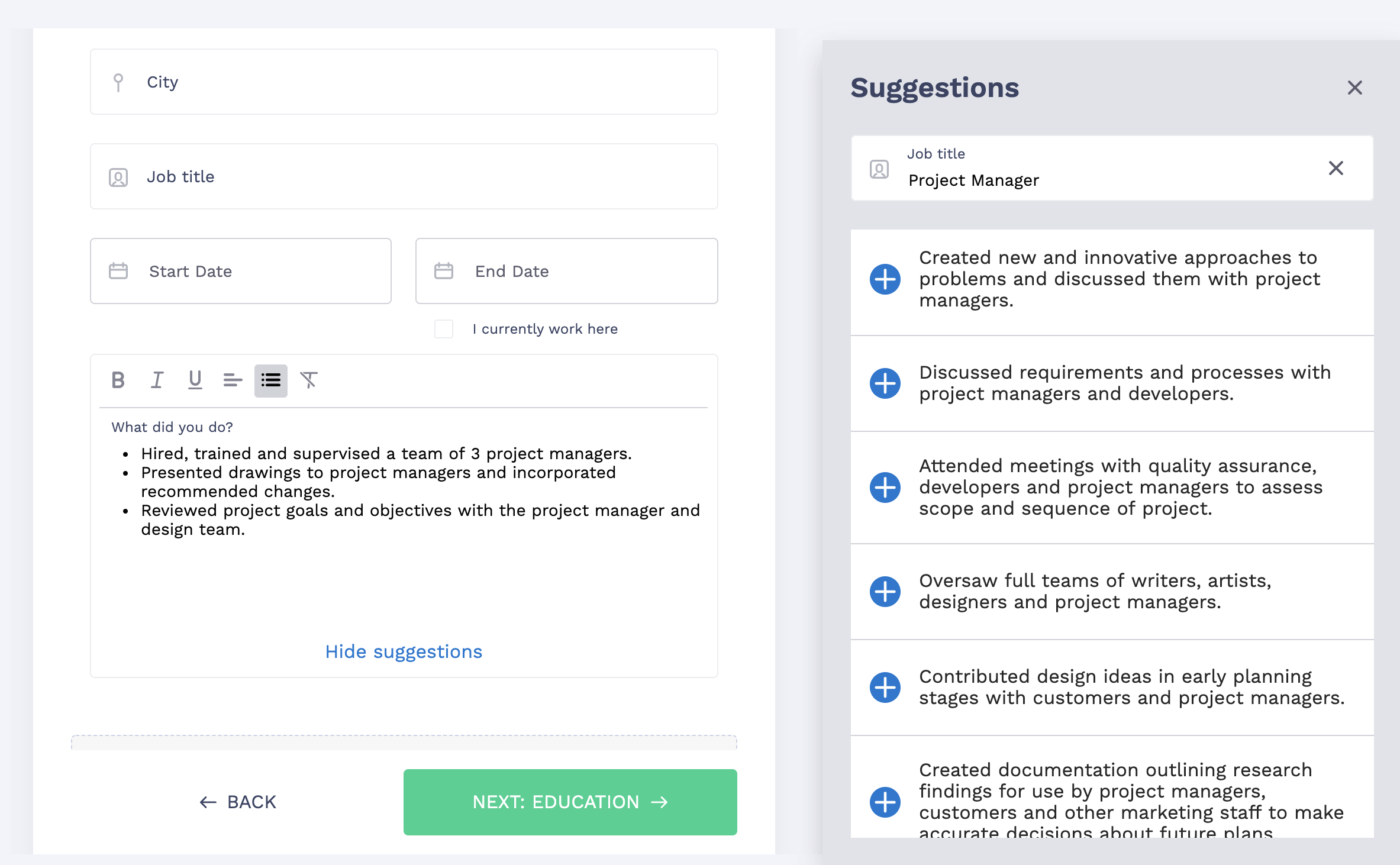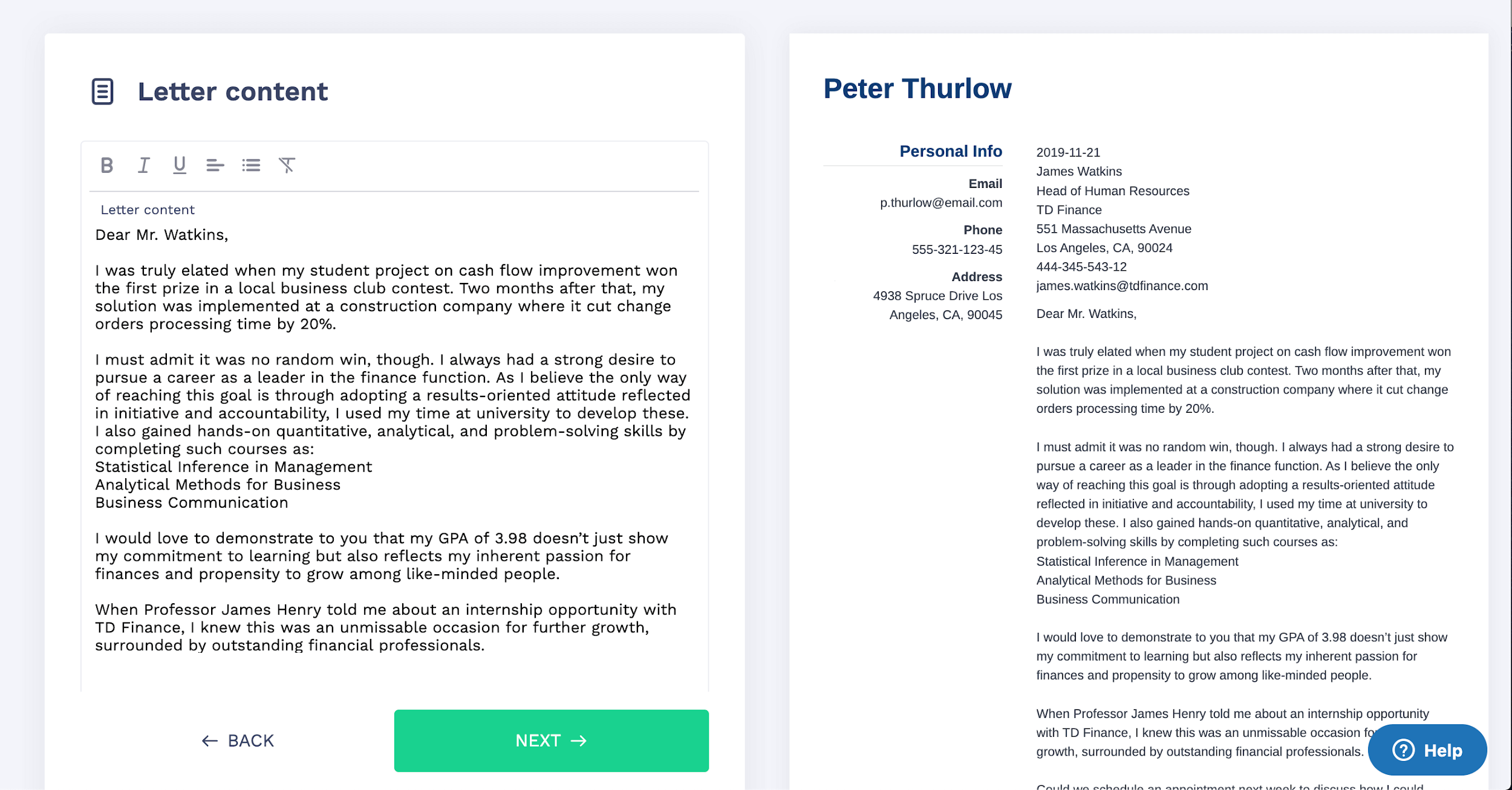Here’s the deal:
Helping to hand-raise baby baboon orphans in South Africa sounds exciting.
The question is—
Is it worth doing? Will it increase the chances of getting hired once you’re back?
You’re a quick scroll-down away from the truth. Let’s take a look at some facts to see the benefits of volunteering.
Create my resume now

Create a job-winning resume with little effort. Hack your way through ATS software with our 18 beautiful templates—give our builder a try!
What is Volunteering?
Here’s a fun fact:
One in three U.S. adults volunteered through an organization. That makes volunteering an important aspect of American society, to say the least.
Now—what exactly is voluntary work?
Simply put, volunteering is when people dedicate their time to help other people, groups, or organizations for no financial or social gain.
Below are five examples of what volunteers can do:
- Raise money for a local Red Cross.
- Offer help to people in need of affordable housing and food.
- Help local animal shelters with general administrative duties or adoption drives.
- Participate in a local, state or national election to support a candidate.
- Coach individuals with intellectual disabilities through athletic competition.
- Volunteer abroad to make meaningful contributions to community projects in the areas of healthcare, education, childcare, construction, etc.
Impact on the community is the obvious benefit of volunteering. But—
Here's more proof that from doing good comes even more good.
Benefits of Volunteering
1. Find Your First Job Through Volunteering.
Picture this:
You’ve just graduated from college. A grad cap on your desk and a question in your mind: what next?
How to land that first entry-level job?
That’s when volunteering waltzes in.
One of the benefits of volunteering is that it supercharges a junior resume and signals to recruiters you're a candidate who takes action.
Except—employers don’t count volunteer work as experience, right?
Think again.
A LinkedIn survey found that 41% of recruiters consider volunteer work equal to a paid job.
So—
Getting volunteer experience can put turbo thrusters on your early employability chances.
Another great thing about volunteering is that it helps you learn what makes you click before you apply for full-time jobs.
- Do you prefer to work at a powerhouse or a dynamic startup?
- Do you thrive on teamwork or you’re better off being autonomous?
- Do you prefer to be in the trenches or would you rather orchestrate administrative tasks?
Volunteer work can equip you with invaluable self-knowledge, so you can put your finger on your first career move without much hassle.
2. Boost Your Hireability With Volunteer Work
Let’s turn the tables.
Say you’ve punched a clock for years now. You’ve sweated your way up the ladder and had several promotions along the way.
But—
Every now and then, you go on LinkedIn to browse Fortune 500 openings that could launch your career into the stratosphere.
The only problem is:
The competition for those jobs is fierce.
But—all is not lost.
Say hello to Sophia. She’s a high-end recruiter on the lookout for top-notch candidates.
She’s scanned 200+ resumes already and all of them look the same.
Finally, she picks an application that blows the competition out of the water.
What helped it stand out? Volunteer work.
Akin to a mind-boggling 82 percent of recruiters, Sophia favors candidates with volunteer experience on a resume.
But—
For volunteer work to give a boost to your application, you need to find a volunteer position related to your field (e.g., marketing, finance, web design).
Otherwise, it won’t matter if you organized a local food drive or supported humanitarian activities in war-torn countries.
So tick that box and see your career hit a new high.
3. Make Impactful Connections Through Volunteering
I know: the word networking already gives you the willies. You feel it’s something door-to-door salespeople do.
But—
A recent survey argues that 85 percent of people find jobs through networking.
Why?
Think about it from a recruiter’s perspective.
When an existing staffer refers a connection, the recruitment process gets a lot cheaper and faster because there’s someone who can vouch for them.
Plus, most referred hires don’t jump ship as soon as they hit the one-year mark, and that’s good for business.
Good news?
One of the benefits of volunteering to the community is that it offers an abundance of opportunities to network and meet new people: board members, employees, other volunteers, etc.
There’s more: unlike networking at meet-ups, volunteering gives you access to work with these people side by side.
Result?
You become more than someone they just met and forgot. You’re now the first-line connection with backdoor access to killer jobs.
Just keep in mind:
Things don’t happen overnight.
You won't always cross paths with someone (especially a board member) that holds a ticket to your future job.
And even then, you’ll need to spend every ounce of your energy to impress them with your commitment, accountability, and work product.
4. Improve Your Hard and Soft Skills Through Volunteering Skill Sets
It sucks to be in a rut.
Once the new-car smell of the job wears off, you might hit a plateau and stop growing.
While some companies offer robust training programs, others coach their employees to do a specific task and keep them in the role until the wheels fall off.
Problem?
If you don’t expand your skills for a resume, it’ll decrease your value proposition because there are only so many things you can do for a company.
So—
To max out your ROI, you need to pick up new skill sets, and volunteering can be a solid option.
Volunteer organizations operate very much like for-profits, except for the funding part.
There are operational departments like marketing, accounting, etc. that offer plentiful options to pick not only hard skills (e.g., MS Excel, SEO), but also soft skills.
For instance, most volunteer tasks involve working with a diverse mix of people. As a result, you get a chance to improve teamwork skills, so you can gel better with others.
Plus, you’ll run into various roadblocks at some point, and that will inevitably help fine-tune your problem-solving and creative-thinking skills.
Best part?
Because volunteer organizations don’t pay for work, you’ll soak up the knowledge in a low-risk environment. So even if you fail a couple times, you won’t lose a job.
The ResumeLab builder is more than looks. Get specific content to boost your chances of getting the job. Add job descriptions, bullet points, and skills. Easy. Improve your resume in our resume builder now.
CREATE YOUR RESUME NOW

Nail it all with a splash of color, choose a clean font, and highlight your skills in just a few clicks. You’re the perfect candidate, and we’ll prove it. Use our resume builder now.
5. Fill in Employment Gaps With Volunteering Experience
Here’s a nightmare scenario:
You’ve just got the pink slip. You’re being sucked into a vortex of life without work and living on Top Ramen.
You spend the next six months looking for a job and finally land an in-person interview with Sophia.
She asks, “What did you do for those six months you were between jobs?”
You stutter and say, “I binge-watched HBO. I must say Chernobyl is a great show, did you watch it?”
The result? It’s a done deal.
But—
Let’s rewind to Sophia’s question:
What did you do for those six months you were between jobs?
“My company terminated my contract, and I decided to use the time between jobs to
make a difference. I volunteered as a youth sports coach to improve my leadership and
organizational skills.”
A massive difference.
As a proof of concept, the Corporation for National and Community Service has recently issued a report.
It states that volunteers have a whopping 27 percent higher chance of landing a job after being out of work compared to non-volunteers.
So—
If you have an employment gap to fill, volunteering is an absolute home-run on resumes.
Expert Hint: Since volunteer experience counts as professional experience, list it on your resume using your job titles (e.g., project coordinator) instead of the generic “volunteer” title.
6. Dip Your Toes Into a New Career Through Volunteering
You know it’s everything but easy to switch gears midway.
Things get worse if you have a family to look after and a hefty mortgage to pay off.
And—
It might leave a stain on your resume if you decide to quit your job for a few months and check other options.
Here’s when volunteer work comes to the rescue!
It’s a low-stakes way to explore a new career path.
It lets you see first-hand what it’s like to work in that or other field and then decide if you want to do it further down the road.
Here’s an example:
Say you live and breathe photography.
Problem?
Unless you take pics like Peter McKinnon, there’s no way you could get a photography gig without prior experience.
That’s when volunteering sends up a rescue flare.
Just Google “photography volunteer jobs” and get legit on-the-job experience (stick around to learn more about finding volunteer jobs.)
And once you get a ton of photography skills, you can leverage both into a paid gig in the future.
Remember—
As long as you’re honest about your skill level with a volunteering organization, there won’t be any issues.
7. Improve Your Well-Being with Volunteering
Here’s the thing:
Volunteer work is a two-way street: you feel good because you help others, and others feel good because they get the much-needed help.
Result?
You experience a mental pick-up that helps get unstuck and put you in the right mindset to take action with your career.
Need proof?
A recent study published in the BMJ Open journal states that people who often engage in volunteering are happier.
Why?
When we offer a helping hand to others, the “hug hormone” called Oxytocin is released. As a result, we feel calmer and less stressed out.
There’s also this Carnegie Mellon University study.
It argues that adults over age 50 that volunteer regularly have a lower chance of developing hypertension than non-volunteers.
So—
If you commit to volunteering, it’ll increase your happiness levels and empower you to take charge of your career path.
How to Get Your Foot in the Door of Volunteering
So far so good.
You know volunteering can help your career discover your true north and at the same time help your community.
But—
You think you don’t have time to take on the added responsibility. You already have a lot of hats to wear and many plates to spin.
Well—
Volunteering isn’t about how much time you devote. It’s about quality.
So—even with a packed schedule, you can offer a helping hand. Here’s where to find the right volunteering opportunities:
10 Best Volunteering Sites
- VolunteerMatch.org. Over 70,000 volunteer opportunities. Just type a keyword-based on the preferred activity (e.g., IT) and get showered with offers.
- Idealist.org. Around 400+ nonprofit jobs.
- All for Good. A whopping 150,000 local volunteer listings in major cities.
- Catchafire. A certified B-corporation that lets you pitch in to help with what you’re good at.
- Create the Good. A skill-based volunteer platform with over 50,000 opportunities.
- The Nonprofit Times Career Center. A staggering 500+ nonprofit jobs for employees of all levels, including college students.
- HERC Jobs Page. About 40,000 jobs in education, many of which are nonprofit.
- WorkforGood.org. Over 300 nonprofit listings.
- The Bridgespan Group’s Nonprofit Job Board. Around 350 nonprofit jobs, most of which are for directors.
How to Find Volunteering Opportunities Near Me
Want to see things to get involved in near me? All it takes is run a simple Google search. Just type into Google:
- Volunteer organizations near me
- Nonprofits nearby
- Local nonprofits
- NGOs in my area
Plus—
Google can also help you find good volunteer opportunities based on the skills you have or want to get.
Just punch in [marketing] + volunteer opportunities, and Google will scrape tons of listings from volunteer platforms and major job boards like LinkedIn and Indeed.

Double your impact with a matching resume and cover letter combo. Use our cover letter generator and make your application documents pop out.
CREATE YOUR COVER LETTER NOW

Want to try a different look? There’s 18 more. A single click will give your document a total makeover. Pick a cover letter template here.
So—What Do You Think?
There you have it.
A whopping seven volunteering benefits for your career + how to find legit volunteer opportunities.
Now—
Have you ever tried volunteering? If so, what kind of impact did it have on your career?
Let me know in the comments. I’d love to chat!









![Outline for a Cover Letter: Guide for 2026 [+ Examples]](https://cdn-images.resumelab.com/pages/outline_rl_us_thumbnail.jpg)
